Overview
Navigating the path to secure disability benefits for bipolar depression can be challenging. We understand that many individuals face unique struggles during this process. This article outlines five essential steps to help you on this journey:
- Understanding the condition
- Determining eligibility
- Gathering documentation
- Submitting the application
- Troubleshooting common challenges
Each step emphasizes the importance of thorough documentation and a clear understanding of the SSA's criteria. Remember, you are not alone in this process; support is available from advocacy organizations that can guide you effectively.
As you embark on this journey, know that every detail matters. Gathering the right documentation can make a significant difference in your application. It's common to feel overwhelmed, but taking it step by step can ease the burden.
We encourage you to reach out for help and connect with others who have navigated similar challenges. Together, we can make this process more manageable. You are deserving of support, and we are here to help you every step of the way.
Introduction
Navigating the complexities of securing disability benefits for bipolar disorder can often feel overwhelming. We understand the significant impact this condition has on daily functioning and employment. Individuals grappling with bipolar depression face unique challenges that can hinder their ability to maintain steady work.
It’s crucial to understand the application process and eligibility criteria set forth by the Social Security Administration (SSA). What steps can you take to effectively present a case that highlights the debilitating nature of this mental health condition? Together, we can explore how to secure the benefits you deserve.
Understand Bipolar Disorder as a Disability
Bipolar condition is a mental health issue characterized by severe mood fluctuations, including emotional peaks (mania or hypomania) and valleys (depression). We understand that these mood swings can profoundly affect your ability to work and manage daily activities. The Social Security Administration (SSA) recognizes bipolar depression disability as a condition when it significantly hinders your functioning. It's important to familiarize yourself with the symptoms, such as:
- Difficulty concentrating
- Maintaining relationships
- Managing daily tasks
These will be crucial in your application process.
Statistics show that individuals with bipolar condition may struggle to perform tasks for an average of 65.5 days each year, highlighting the condition's impact on daily life. Additionally, nearly 90% of individuals report satisfaction with their current medications, yet side effects can still disrupt daily activities and job performance. Mental health specialists emphasize that the condition can create substantial challenges in maintaining steady employment, as mood fluctuations often interfere with productivity and personal connections.
Real-world examples illustrate how bipolar condition affects job performance. For instance, during depressive episodes, individuals may find it hard to concentrate, leading to reduced productivity and potential job loss. On the other hand, during manic phases, impulsivity might lead to risky decisions that threaten job security. Understanding these dynamics is vital for effectively conveying how bipolar depression disability affects your daily life and work when applying for disability benefits.
At Turnout, we're here to support you in navigating the complexities of SSD claims. Our skilled nonlegal advocates are dedicated to helping you understand the application steps and ensuring you present your case effectively. While we are not a law firm and do not provide legal representation, our expertise in guiding clients through these processes can be invaluable in securing the benefits you deserve. Remember, you are not alone in this journey; we are here to help.
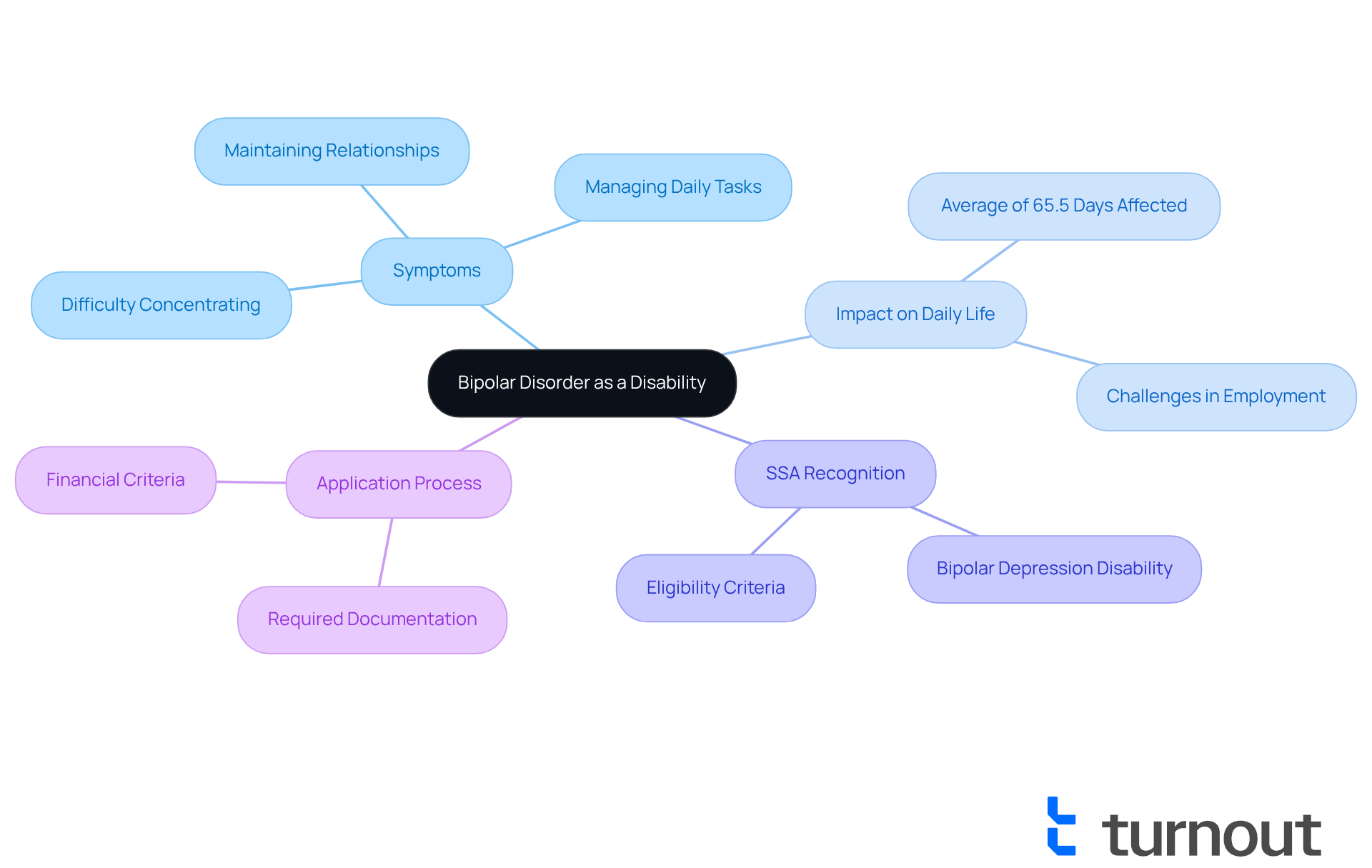
Determine Eligibility for Disability Benefits
If you’re considering applying for disability benefits due to bipolar disorder, it’s essential to understand the specific criteria set by the Social Security Administration (SSA). We recognize that navigating this process can be challenging, especially when your condition significantly affects your ability to perform daily tasks. You’ll need to demonstrate a documented history of manic and depressive episodes, along with evidence showing how these episodes impact your daily life and work capabilities related to bipolar depression disability.
The SSA’s Blue Book is a valuable resource that outlines the medical criteria for mental disorders, helping you assess your eligibility. If your condition doesn’t fully meet these criteria, it’s crucial to evaluate whether it substantially impairs your ability to engage in basic work activities. Remember, it’s common to feel overwhelmed, as approximately two-thirds of initial SSDI applications are rejected. This statistic highlights the potential hurdles you may face during the application process.
To strengthen your claim, gather important documents such as:
- A Residual Functional Capacity assessment
- A personal medical journal detailing your symptoms
- A disability letter from your doctor confirming the severity of your condition
It’s worth noting that the SSA acknowledges that even subsyndromal symptoms of bipolar depression disability can disrupt employment, underscoring the necessity of comprehensive medical documentation to support your claim.
You are not alone in this journey. Turnout offers support through trained nonlawyer advocates who can help you navigate the SSD claims process, ensuring you have the resources and guidance you need. Additionally, statistics show that individuals with bipolar disorder are 48% less likely to be employed compared to those without psychiatric conditions. This emphasizes the significant impact this condition can have on your work performance. Remember, we’re here to help you every step of the way.
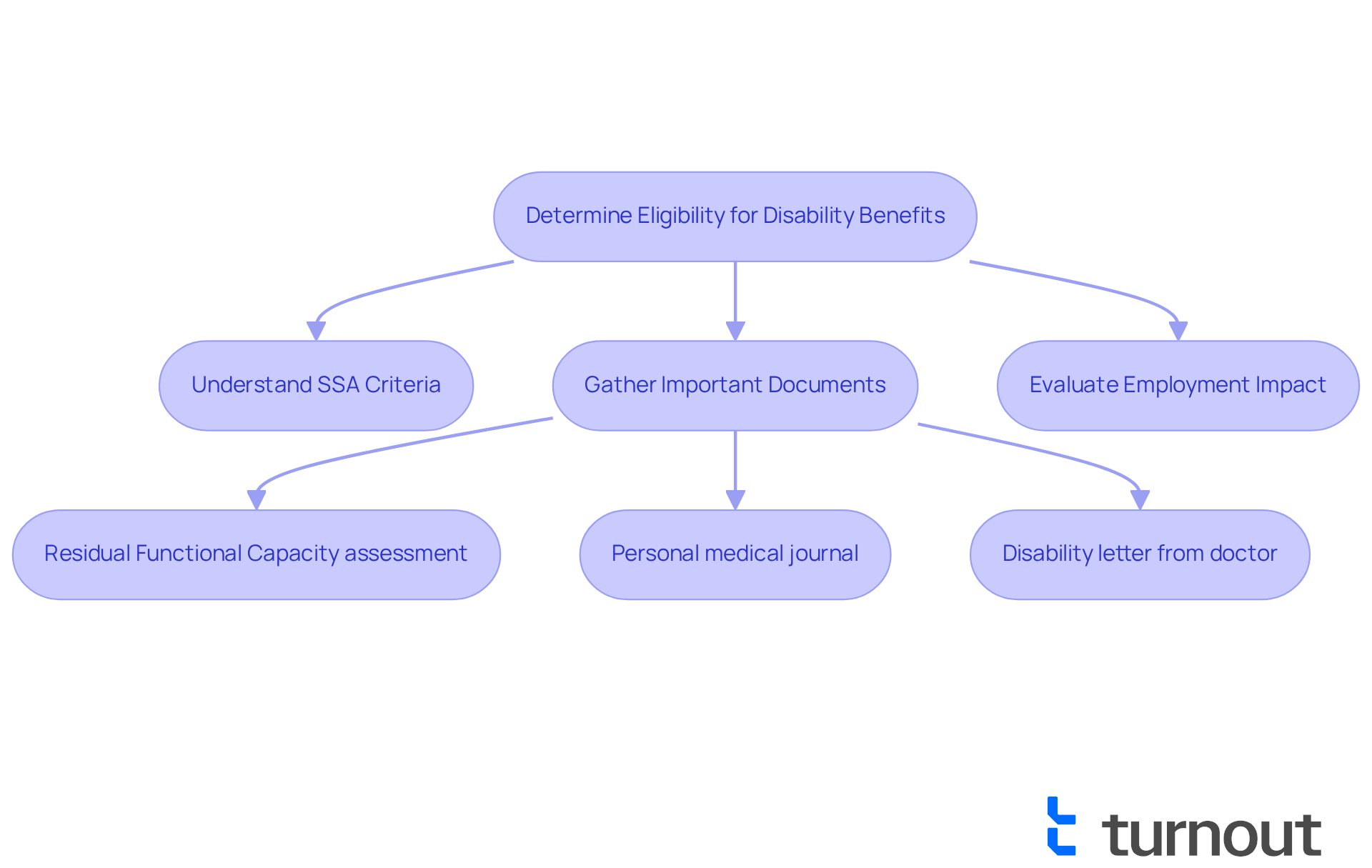
Gather Required Documentation and Complete the Application
Begin by collecting all pertinent medical records, including diagnoses, treatment history, and notes from healthcare providers. Filling out the SSA's forms is essential, and you can do this online or in person. We understand that detailing your symptoms, treatment plans, and the ways your condition impacts your daily life can feel overwhelming, but being meticulous in this process is crucial. Additionally, gathering personal statements from family members or friends who can share their insights into how bipolar condition affects your functioning can provide valuable support for your claim. This comprehensive documentation is key to bolstering your case.
The Social Security Administration recognizes bipolar depression disability as a disabling condition. However, the procedure can be prolonged and necessitates significant proof. Important documents that strengthen your SSD claim include:
- Residual Functional Capacity assessments
- A personal medical journal that outlines your symptoms and their effects on your daily activities
Recent modifications in the SSA procedure for mental health disorders have made it vital to provide a clear depiction of how your bipolar depression disability restricts your capacity to work. It's common to feel anxious about this process, but successful submissions often depend on showcasing the severity of your symptoms and their influence on your job performance. While collecting medical records may require time, remember that it is an essential step in ensuring your submission is strong.
Incorporating insights from healthcare providers about your treatment history can further support your case. The more thorough and detailed your documentation, the better your chances of securing the benefits you deserve. You're not alone in this journey; we're here to help you navigate through it.
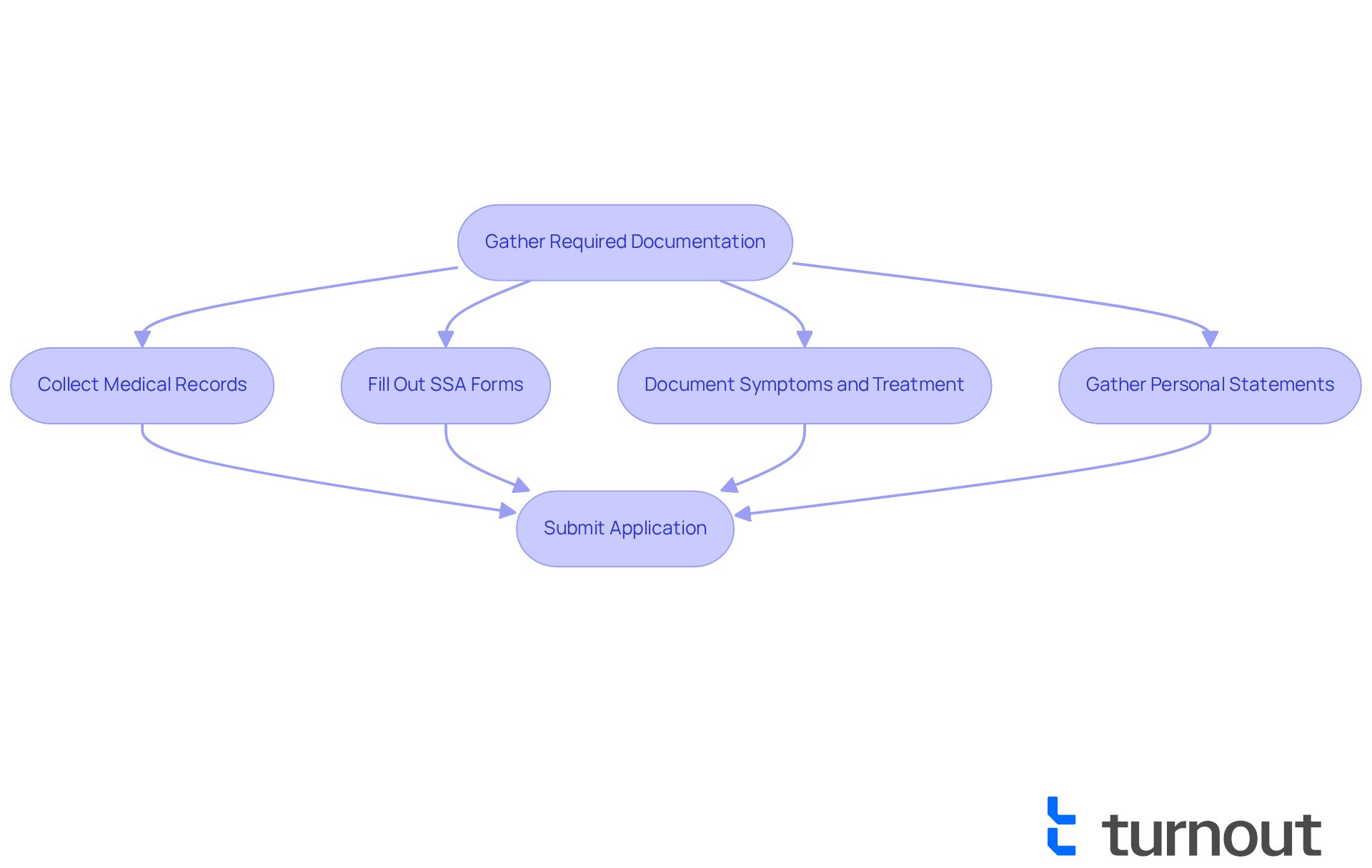
Submit Your Application and Understand the Review Process
Once you have completed your submission and gathered all necessary documentation, we encourage you to send your request through the SSA's online portal or at your local SSA office. We understand that following submission, your request will be assessed, which may take 3-5 months. During this time, it’s common for the SSA to request additional information or schedule a consultative examination, which can extend the timeline.
To ease your concerns, remain proactive by regularly monitoring the status of your submission and responding promptly to any inquiries from the SSA. Comprehending this process can help reduce anxiety and prepare you for the next steps. Remember, you're not alone in this journey. Turnout is here to assist you through trained non-legal advocates who can help you navigate this intricate system, ensuring that your submission is thorough and minimizing potential delays.
It's important to note that while Turnout provides valuable support, it is not a law firm and does not offer legal representation. We’re here to help you every step of the way.
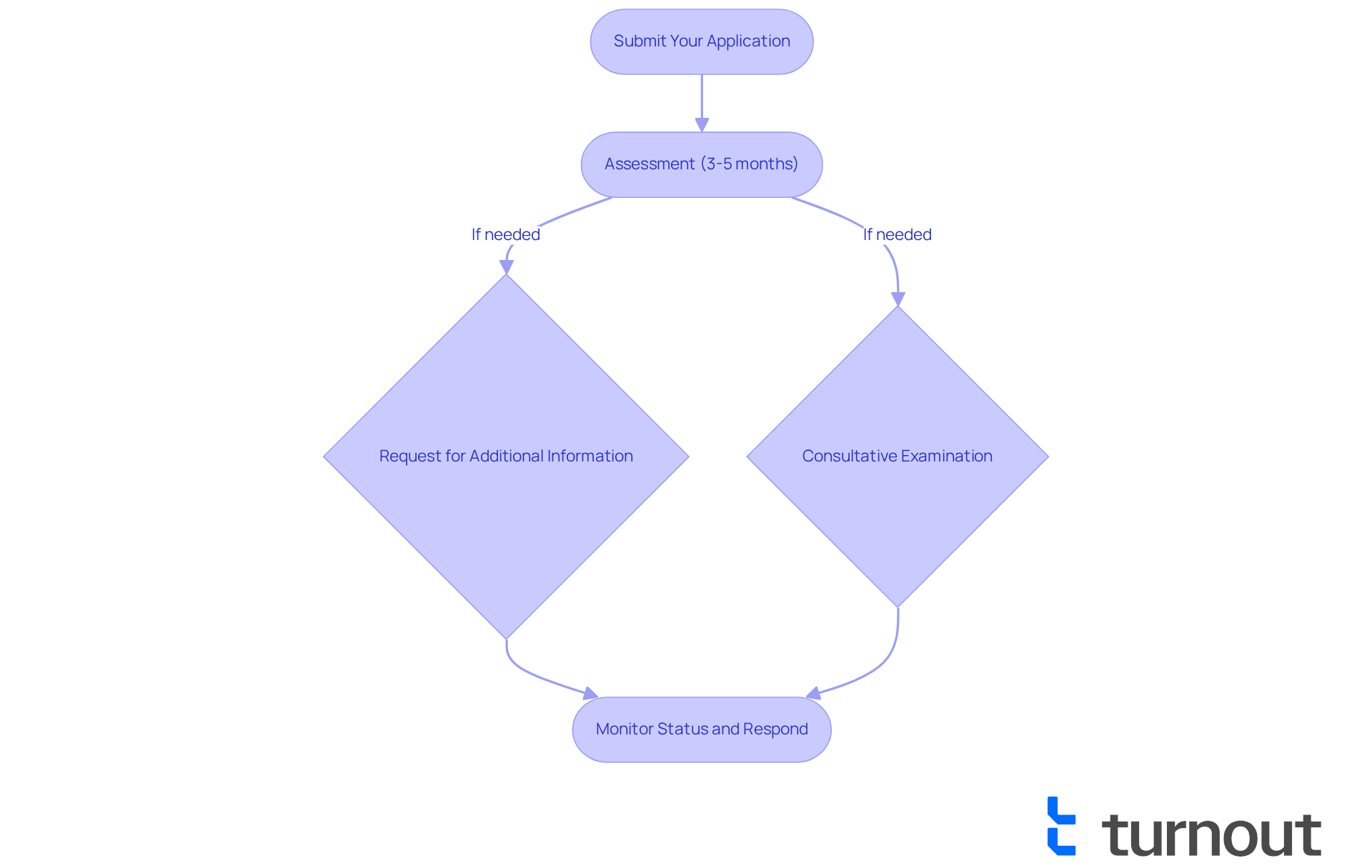
Troubleshoot Common Application Challenges
Many candidates face challenges when seeking disability benefits, often due to incomplete medical documentation or delays in processing. We understand that these obstacles can be frustrating. To help navigate these issues, ensure that all your documentation is thorough and accurate before submission.
If your application is denied, please don’t feel discouraged; you have the right to appeal this decision. Familiarize yourself with the appeals process, and gather any additional evidence that could strengthen your case. Remember, you are not alone in this journey.
Turnout offers valuable tools and services to assist you in navigating these complexities. Our trained nonlawyer advocates are here to support you with SSD claims. Consider reaching out to advocacy organizations or utilizing Turnout's resources to simplify your access to government benefits and financial support. Together, we can work towards a brighter path for you.
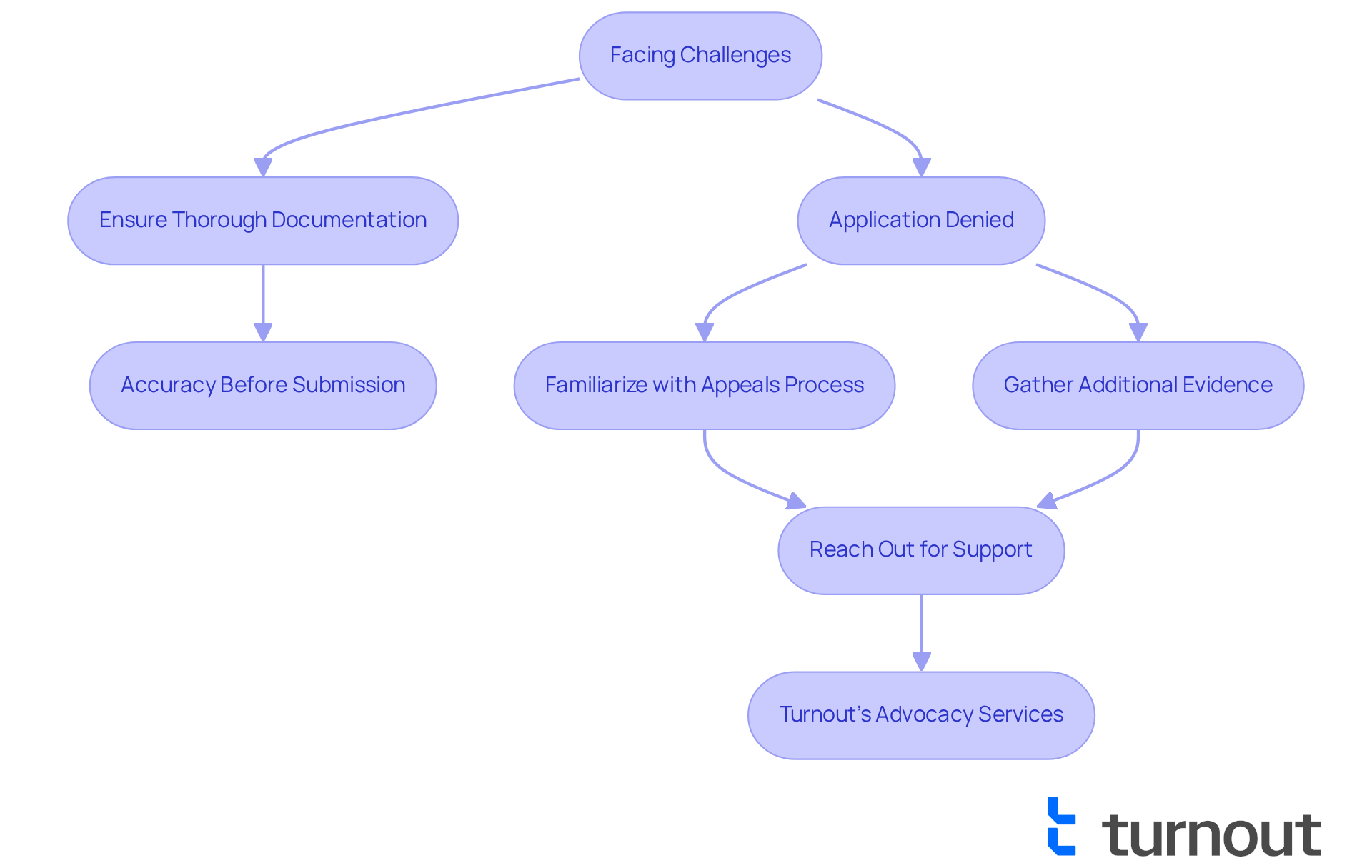
Conclusion
Successfully navigating the complex landscape of securing disability benefits for bipolar depression can feel overwhelming. We understand that this journey requires a comprehensive understanding of both the condition and the application process. Bipolar disorder can significantly impact daily functioning and employment capabilities, making it essential for you to clearly articulate how your symptoms interfere with your life. By familiarizing yourself with the eligibility criteria set by the Social Security Administration (SSA) and recognizing the importance of thorough documentation, you can significantly enhance your chances of receiving the benefits you deserve.
Throughout this article, we have outlined key steps to assist you:
- Understanding bipolar disorder as a disability
- Determining eligibility
- Gathering necessary documentation
- Submitting your application
- Troubleshooting common challenges
Each of these steps is vital in building a strong case for disability benefits. Remember, you are not alone in this process. Support is available through advocacy organizations and non-legal advocates who can guide you through the intricacies of the application.
In conclusion, securing disability benefits for bipolar depression is not just about meeting criteria; it’s about effectively communicating the challenges posed by the disorder. With the right resources and support, you can navigate this journey with confidence. Taking proactive steps, gathering comprehensive documentation, and seeking assistance can transform the application process into a pathway toward the financial support necessary for managing bipolar disorder. Embracing these strategies can lead to successful outcomes and a brighter future for you and others affected.
Frequently Asked Questions
What is bipolar disorder and how does it affect daily life?
Bipolar disorder is a mental health condition characterized by severe mood swings, including episodes of mania or hypomania and depression. These fluctuations can significantly impact an individual's ability to work and manage daily activities, leading to difficulties in concentrating, maintaining relationships, and managing tasks.
How does the Social Security Administration (SSA) view bipolar disorder as a disability?
The SSA recognizes bipolar disorder as a disability when it significantly hinders an individual's functioning. This recognition is crucial for those seeking disability benefits, as it acknowledges the profound impact the condition can have on daily life and work performance.
What are the symptoms to be aware of when applying for disability benefits due to bipolar disorder?
Key symptoms to be aware of include difficulty concentrating, maintaining relationships, and managing daily tasks. Documenting these symptoms is essential for the application process.
How often do individuals with bipolar disorder struggle with daily tasks?
Statistics indicate that individuals with bipolar disorder may struggle to perform tasks for an average of 65.5 days each year, highlighting the condition's impact on daily life.
What challenges might individuals with bipolar disorder face in the workplace?
Individuals may experience reduced productivity during depressive episodes due to difficulties in concentration, while manic phases can lead to impulsive decisions that threaten job security. These dynamics can create substantial challenges in maintaining steady employment.
What documentation is needed to apply for disability benefits due to bipolar disorder?
To strengthen your claim, you should gather important documents such as a Residual Functional Capacity assessment, a personal medical journal detailing your symptoms, and a disability letter from your doctor confirming the severity of your condition.
What resources can help in understanding eligibility for disability benefits?
The SSA’s Blue Book outlines the medical criteria for mental disorders and can help assess eligibility for disability benefits related to bipolar disorder.
What is the likelihood of having an initial SSDI application rejected?
Approximately two-thirds of initial SSDI applications are rejected, indicating potential hurdles in the application process for individuals with bipolar disorder.
How does Turnout assist individuals applying for disability benefits?
Turnout offers support through trained nonlawyer advocates who help navigate the SSD claims process, ensuring individuals have the resources and guidance needed to present their cases effectively.
What is the employment outlook for individuals with bipolar disorder?
Statistics show that individuals with bipolar disorder are 48% less likely to be employed compared to those without psychiatric conditions, emphasizing the significant impact this condition can have on work performance.




